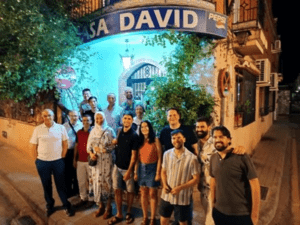How to perform high quality federated learning when different labels of different types exist is the goal of our research.
Gaussian process is the future direction of personalized federated learning
It is my pleasure to undertake a two-month secondment at the University of Granada, Spain from June to July 2022. There I collaborated with Ph.D. Candidate Arne Schmidt under the supervision of Prof. Rafael Molina. The theme of this secondment is about federated learning and Gaussian process. Before I arrived in Spain, Prof. Rafael Molina sent me two papers to learn their contents.
During these two months, we held weekly meetings to exchange our learning progress in federated learning and Gaussian process. Arne Schimidt gave me a tutorial on Gaussian Processes and Bayesian Neural Networks. At the same time, Prof. Rafael Molina often introduces us to some seminars on different topics such as Transformer. During this period, I also had the opportunity to participate in the defense of Miguel López-Pérez’s doctoral thesis. The topic of the thesis is: Probabilistic Methods for Image and Signal Classification. Applications to Medicine and Volcanology.
As a result of this secondment, we will collaborate on a thesis on federated learning in healthcare. Currently, under the CLARIFY project, there are multiple different cancer datasets. However, different datasets are labeled differently. For example, on one dataset, only binary labels about whether the image contains cancer cells, while another dataset is labeled in detail: the severity of cancer cells, such as early stage, middle stage, terminal stage. How to complete high-quality federated learning in this situation is the direction of our research. We will consider combining federated learning with Gaussian processes.
Aside from work, Miguel López-Pérez gave us a lot of hospitality in Granada, gave us insight into the city and taught us some everyday Spanish. Thank you!
Finally, thanks to Prof. Rafael Molina for his hospitality.
Jiahui Geng – ESR3.


